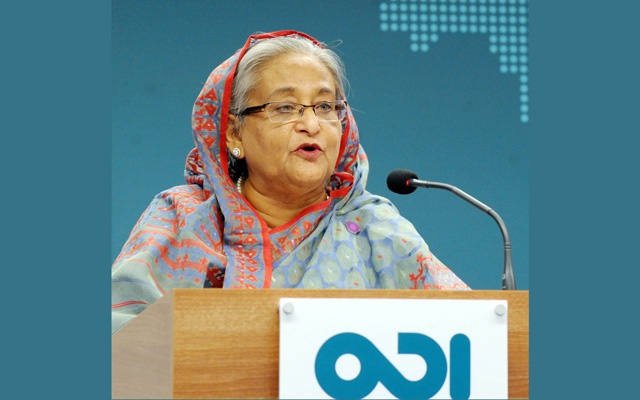Invest more in Bangladesh

Prime Minister Sheikh Hasina on Monday urged the US businessmen to invest more in Bangladesh as the country's strategic location is making it an emerging hub for regional connectivity, foreign investment and global outsourcing.
"I invite you to come to Bangladesh with your businesses, technology, and innovations for mutual benefits. Please join us in our journey of shared profit and prosperity. I assure you of my government's full support and cooperation," she said.
The prime minister, now in New York to attend the 73rd session of the United Nations General Assembly, made the call while addressing a luncheon meeting with the US Chamber of Commerce (USCC).
The USCC arranged the meeting at hotel Grand Hyatt where the Bangladesh prime minister is staying.
Hasina said, "Bangladesh's strategic location is making us an emerging hub for regional connectivity, foreign investments and global outsourcing. We've taken initiatives to connect our Indian, Chinese and South East Asian neighbours. Bangladesh could be a gateway to a market of 4 billion people -- itself offering a strong and growing market of 160 million."
Stating that Bangladesh has undertaken employment generating mega projects, she mentioned, "We're ready to take up more in diversified areas of infrastructure, connectivity and high-tech for sustainable double-digit growth. To the thrust sectors, I add growing services sectors of banking and finance, tourism, health and education."
Hasina said, "We also want to open new avenues of blue economy. We're establishing 100 exclusive economic zones for new industries and investment at both public and private sectors. Two dozen high-tech parks are ready."
Mentioning that Bangladesh has the most liberal investment policy in South Asia with most attractive incentives and highest profit rate, the prime minister said the policy includes protection of FDI by law, incentives like generous tax holiday, concessionary duty on import of machinery, duty-free import of raw materials, and remittances on royalty.
Other advantages for investors include the young, committed and easily trainable workforce with highly competitive wages, cheaper costs of setting business, access to a large duty-free quota free market, low cost electricity and water, Bangladesh's good credit rating, minimum risk factors, and fast technology adaptability, she added.
Focusing on socio-economic uplift and economic development of Bangladesh, the prime minister said the economy grew at an average rate of 6.6 percent during her government's nine and a half years.
The GDP growth was 7.86 percent in the last fiscal year, which is expected to be 8.25 percent in the next fiscal year, she said adding the foreign currency reserve has grown more than 9 times to over $33 billion in 2018 from a mere $7.5 billion in 2009.
Hasina said poverty rate has fallen to 21.8 percent from 41.5 percent in 2006.
She said technology and innovation are bringing fast economic transformation in Bangladesh. Having gained self-sufficiency, Bangladesh is now the 3rd largest producer of vegetables, the 4th largest producer of rice, and the 3rd largest producer of inland fisheries in the world, she added.
Currently, Bangladesh is the second largest RMG exporter with exporting $30.61 billion in the last fiscal year, but it is poised to become the first soon, the PM told her audience.
Hasina said bold entrepreneurship and the drive for export diversification with FDI are facilitating new sectors to emerge in the country.
The pharmaceutical industry is one of those that are currently meeting 98 percent of local demand and exporting to about 125 countries, Hasina said adding that shipbuilding is another one."We're exporting medium-size ocean-going vessels to even European countries."
She said knowledge-based ICT sector is thriving on 136 million mobile phone users, 73 million of them using mobile data.
Noting that energy, crucial for high growth, is opening up opportunities for FDI, the prime minister said the electricity production capacity has reached 20,000 megawatts now and it will increase to 40,000 megawatts by 2030 and 60,000 megawatts by 2041.
She said that the USA is the single largest trading partner of Bangladesh with bilateral trade of $7.5 billion in 2016-17 and second largest investment partner with investment of over $3 billion.
